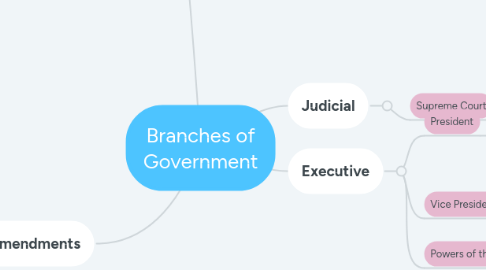
1. Legislative
1.1. House of Representatives
1.1.1. House members must be twenty-five years of age and citizens for seven years
1.1.2. 435 members in the House of Representatives
1.1.3. Members of the House of Representatives serve two terms and are considered for re-election every even year
1.2. Senate
1.2.1. Senators are at least thirty years old and citizens for nine years.
1.2.2. 100 members in the Senate
1.2.3. Senators serve six-year terms and elections to the Senate are staggered over even years so that only about 1/3 of the Senate is up for reelection during any election
1.3. Powers of the legislative branch
1.3.1. Makes laws
1.3.2. Declare war
1.3.3. Regulates inner state and foreign commerce and controls taxing and spending policies
2. Amendments
2.1. 1. Congress shall make no law respecting an establishment of religion, or prohibiting the free exercise thereof
2.2. 2. A well regulated Militia, being necessary to the security of a free State, the right of the people to keep and bear Arms, shall not be infringed.
2.3. 3. No Soldier shall, in time of peace be quartered in any house, without the consent of the Owner, nor in time of war, but in a manner to be prescribed by law.
2.4. 4. The right of the people to be secure in their persons, houses, papers, and effects, against unreasonable searches and seizures, shall not be violated, and no Warrants shall issue, but upon probable cause, supported by Oath or affirmation, and particularly describing the place to be searched, and the persons or things to be seized.
2.5. 5. No person shall be held to answer for a capital, or otherwise infamous crime, unless on a presentment or indictment of a Grand Jury, except in cases arising in the land or naval forces, or in the Militia, when in actual service in time of War or public danger
2.6. 6. In all criminal prosecutions, the accused shall enjoy the right to a speedy and public trial, by an impartial jury of the State and district wherein the crime shall have been committed, which district shall have been previously ascertained by law, and to be informed of the nature and cause of the accusation
2.7. 7. In Suits at common law, where the value in controversy shall exceed twenty dollars, the right of trial by jury shall be preserved, and no fact tried by a jury, shall be otherwise re-examined in any Court of the United States, than according to the rules of the common law.
2.8. 8. Excessive bail shall not be required, nor excessive fines imposed, nor cruel and unusual punishments inflicted.
2.9. 9. The enumeration in the Constitution, of certain rights, shall not be construed to deny or disparage others retained by the people.
2.10. 10. The powers not delegated to the United States by the Constitution, nor prohibited by it to the States, are reserved to the States respectively, or to the people.
3. Judicial
3.1. Supreme Court
3.1.1. The president nominate someone for a vacancy on the court in the Senate votes to confirm the nominee, which requires a simple majority
3.1.1.1. No explicit requirements in the US Constitution for a person to be nominated to become a supreme court justice
3.1.2. Nine justices. One chief justice. Eight associate justices
3.1.2.1. Titled as Chief Justice
3.1.3. Court members can serve life
3.1.4. Rulings cannot be appealed
3.1.5. Decides on cases dealing with the interpretation of the Constitution
4. Executive
4.1. President
4.1.1. A presidential candidate must be a natural born citizen for the United States, a resident for 14 years, and 35 years of age or older
4.1.1.1. 4 year term
4.1.1.1.1. 2 term limit
4.1.2. Chief administrator
4.1.2.1. Chief of State
4.1.2.1.1. Chief legislator
4.1.2.1.2. Chief diplomat
4.1.2.2. Commander in Chief
4.2. Vice President
4.2.1. Be a natural born US citizen, be at least 35 years old, and be a resident in the US for at least 14 years
4.2.1.1. 4 term
4.2.1.1.1. 2 term
4.3. Powers of the executive branch
4.3.1. Being able to veto, or reject, a proposal for a law
4.3.1.1. Appoint federal posts, such as members of government agencies
4.3.1.1.1. Negotiate foreign treaties with other countries
4.3.1.2. Appoint federal judges
4.3.1.2.1. Grant pardons, or forgiveness, for a crime
